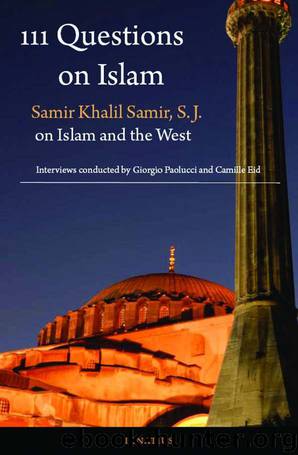111 Questions on Islam: Samir Khalil Samir S.J. on Islam and the West by Samir Kahlil Samir

Author:Samir Kahlil Samir [Samir, Samir Kahlil]
Language: eng
Format: epub, mobi
Tags: Spiritual & Religion
ISBN: 9781681490007
Publisher: Ignatius Press
Published: 2008-11-14T16:00:00+00:00
65. If the Western nations were to make authorization for the construction of mosques within their national borders conditional on similar measures that should be taken in Islamic countries in favor of Christians, we penalize Muslim immigrants by unjustly considering them responsible for the limits imposed on religious freedom in their native countries by their rulers. Do you not think this is a wrong approach to solving the problem?
I am not talking about individual immigrants; that would be silly. Let us not forget that the leaders of the countries that are most often accused of setting the limitations on religious freedom refuse to deal with the problem by claiming that nothing can change because “the problem is the population” and that changing some laws or some habits would be a dangerous venture because it would clash against a centuries-old mentality.
Here is a significant episode: in the 1980s, when President Anwar al-Sādaāt appointed the Christian Boutros Boutros-Ghali to serve as Egypt’s minister of foreign affairs, there were days of riots and protests (fueled by individuals and groups connected to the powerful Muslim university of al-Azhar) that finally obliged the president to withdraw the appointment. At the time, it was said: “See. People do not accept a countercurrent choice like that of entrusting foreign politics to a non-Muslim; therefore, one cannot pass over co-citizens [that is, Muslims] for appointments.”
As for reciprocity, I maintain that in order to avoid this shifting of responsibility from the rulers to the population, one must work on two fronts: first, by applying diplomatic, political, and economic pressure (as in setting conditions for receiving foreign aid) on the governments that impede the exercise of religious freedom; second, by asking immigrating Muslims and their organizations, which are active and ever ready to protest in order to claim their rights in the West, to work in the same manner toward achieving similar rights for non-Muslims from the authorities of their native countries.
It is evident that in both cases there is a preliminary condition for whatever request is made. Much stronger attention must be paid to the issue of religious rights and freedom by international organizations and the authorities of each country. All of this in turn demands the mobilization of society and religious institutions.
Lastly, it is necessary to remember that the nations who financially support the actual construction of most of the mosques in the world are Saudi Arabia and some Gulf nations. These are the very same states that forbid the construction of any non-Muslim religious structures and strongly limit religious freedom. In my opinion, this money should be considered “dirty” money, as is done with the funds that sustain terrorism. Suitable measures could be taken in order to block its use in Europe or at least to tie its usage to the establishment of a greater religious freedom in Saudi Arabia and the Gulf states. The request must come from the Western governments in order to achieve some form of religious reciprocity for non-Muslim populations living in Muslim nations.
Download
111 Questions on Islam: Samir Khalil Samir S.J. on Islam and the West by Samir Kahlil Samir.mobi
This site does not store any files on its server. We only index and link to content provided by other sites. Please contact the content providers to delete copyright contents if any and email us, we'll remove relevant links or contents immediately.
The History of Jihad: From Muhammad to ISIS by Spencer Robert(2628)
Nine Parts of Desire by Geraldine Brooks(2369)
The Turkish Psychedelic Explosion by Daniel Spicer(2357)
The First Muslim The Story of Muhammad by Lesley Hazleton(2271)
The Essential Rumi by Coleman Barks(2047)
1453 by Roger Crowley(2031)
The Last Mughal by William Dalrymple(1858)
Trickster Travels: A Sixteenth-Century Muslim Between Worlds by Davis Natalie Zemon(1847)
Muhammad: His Life Based on the Earliest Sources by Martin Lings(1646)
God by Aslan Reza(1644)
by Christianity & Islam(1633)
A Concise History of Sunnis and Shi'is by John McHugo(1567)
No God But God by Reza Aslan(1545)
Magic and Divination in Early Islam by Emilie Savage-Smith;(1534)
The Flight of the Intellectuals by Berman Paul(1503)
Nothing to Envy by Barbara Demick(1450)
Art of Betrayal by Gordon Corera(1431)
What the Qur'an Meant by Garry Wills(1394)
Getting Jesus Right: How Muslims Get Jesus and Islam Wrong by James A Beverley & Craig A Evans(1342)
